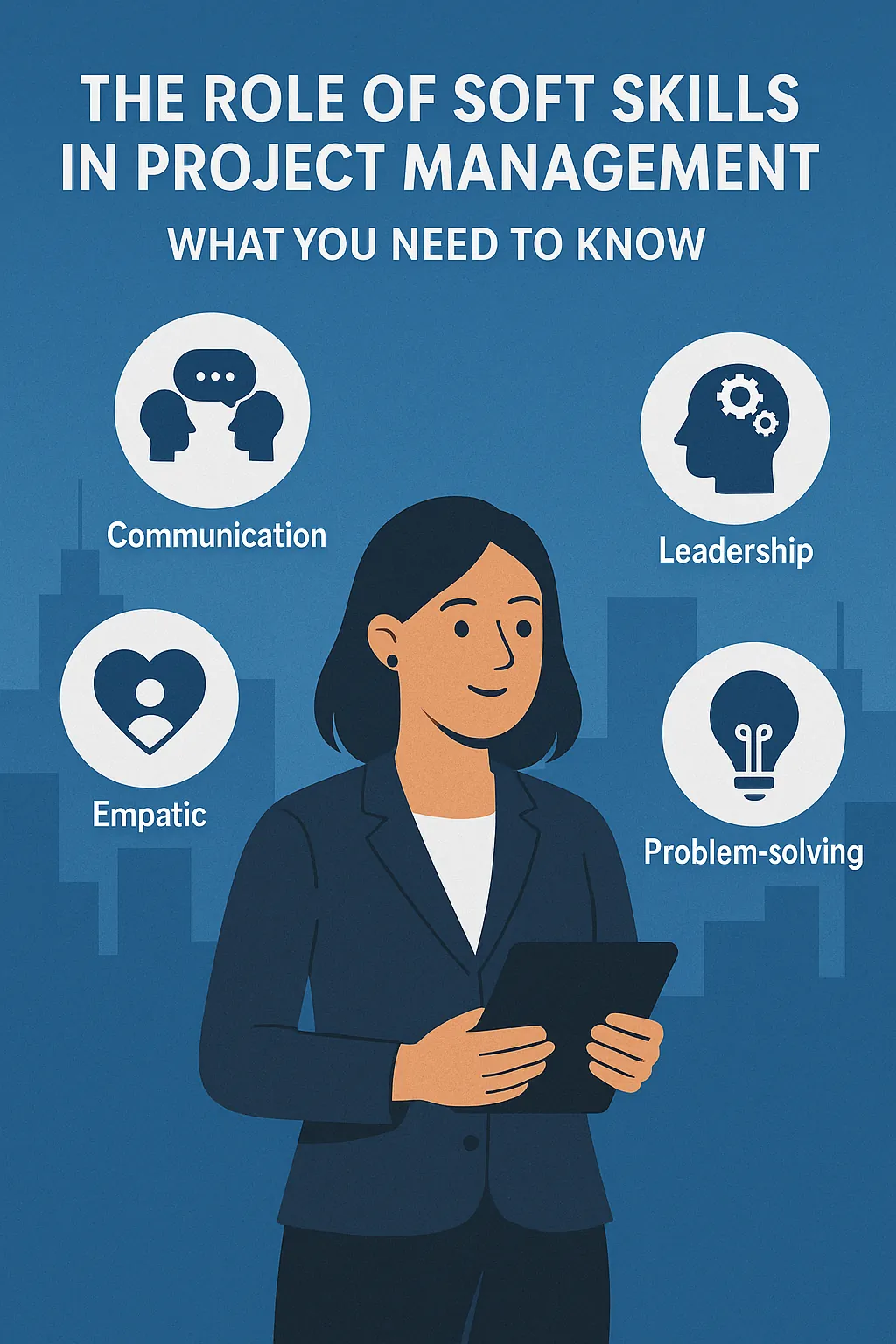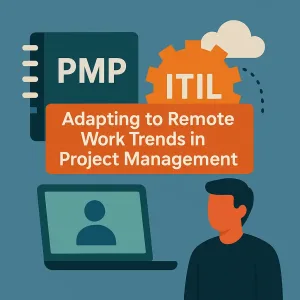Introduction
Project management is a critical discipline that plays a vital role in the successful execution of projects across various industries, including construction, IT, healthcare, and marketing. It involves planning, executing, and overseeing projects to ensure they are completed on time, within scope, and on budget. The significance of project management cannot be overstated, as it directly impacts an organization’s ability to achieve its goals and deliver value to stakeholders.
Technical knowledge is essential; however, it is the soft skills that often determine a project manager’s effectiveness. Soft skills, also known as non-technical skills, encompass a range of interpersonal abilities such as communication, leadership, adaptability, and conflict management. These skills are crucial for fostering collaboration among team members, navigating challenges, and ensuring that projects run smoothly.
This blog post aims to guide aspiring project managers on the importance of soft skills in their journey to becoming effective leaders in the field. By understanding and developing these essential skills, individuals can enhance their ability to manage projects successfully, even if they lack direct experience in the role. Emphasizing the balance between technical expertise and soft skills will provide a comprehensive perspective for those looking to enter the project management profession.
Understanding Project Management
Project management is a structured approach to planning, executing, and overseeing projects to achieve specific goals within a defined timeframe and budget. It encompasses a variety of processes and methodologies that ensure projects are completed efficiently and effectively. For aspiring project managers, understanding the fundamentals of this discipline is crucial, especially when entering the field without prior experience.
What Project Management Involves
At its core, project management involves coordinating resources, managing timelines, and ensuring that project objectives are met. This includes:
- Defining Project Goals: Establishing clear, measurable objectives that guide the project.
- Planning: Developing a detailed project plan that outlines tasks, timelines, and resource allocation.
- Execution: Implementing the project plan while managing teams and resources.
- Monitoring and Controlling: Tracking progress, managing changes, and ensuring that the project stays on course.
- Closing: Finalizing all project activities, delivering the completed project, and conducting a post-project evaluation.
Core Responsibilities of a Project Manager
A project manager plays a pivotal role in the success of a project. Their core responsibilities include:
- Leadership: Guiding and motivating team members, fostering collaboration, and resolving conflicts.
- Communication: Serving as the primary point of contact between stakeholders, team members, and clients, ensuring that everyone is informed and aligned.
- Risk Management: Identifying potential risks and developing strategies to mitigate them.
- Budget Management: Overseeing project finances, ensuring that the project is completed within budget constraints.
- Quality Control: Ensuring that the project deliverables meet the required standards and stakeholder expectations.
Technical Skills Typically Required in Project Management
While soft skills are essential, technical skills also play a significant role in project management. Key technical skills include:
- Project Management Software Proficiency: Familiarity with tools like Microsoft Project, Trello, or Asana to plan and track project progress.
- Data Analysis: Ability to analyze project data to make informed decisions and adjustments.
- Scheduling: Understanding how to create and manage project timelines effectively.
- Budgeting: Skills in financial management to create and maintain project budgets.
- Methodologies: Knowledge of various project management methodologies, such as Agile, Scrum, or Waterfall, to apply the most suitable approach for each project.
What Are Soft Skills?
Soft skills are a combination of interpersonal skills, communication abilities, and personality traits that enable individuals to interact effectively and harmoniously with others. Unlike technical skills, which are specific, teachable abilities related to a particular task or job (such as coding or data analysis), soft skills are more about how you work with people and navigate the workplace environment. They are often more challenging to quantify but are equally, if not more, important in achieving professional success, especially in project management.
Essential Soft Skills Relevant to Project Management
- Communication: Effective communication is crucial for project managers as it ensures that all team members are on the same page. This includes not only conveying ideas clearly but also listening actively to feedback and concerns from team members and stakeholders [2][5].
- Leadership: A project manager must inspire and guide their team, fostering collaboration and driving projects toward shared goals. Leadership involves motivating team members, setting a vision, and making decisions that align with project objectives [3][6].
- Teamwork: The ability to work well within a team is essential. Project managers must cultivate a collaborative environment where team members feel valued and are encouraged to contribute their ideas and skills [4][9].
- Problem-Solving: Projects often encounter unexpected challenges. A project manager must be adept at identifying problems, analyzing potential solutions, and implementing effective strategies to overcome obstacles [5][7].
- Adaptability: The project landscape can change rapidly, requiring project managers to be flexible and open to new ideas or changes in direction. This adaptability helps in managing risks and responding to unforeseen circumstances [9].
- Emotional Intelligence: Understanding and managing one’s emotions, as well as empathizing with others, is vital in maintaining a positive team dynamic. Emotional intelligence helps project managers navigate conflicts and build strong relationships within the team [8][9].
Impact of Soft Skills on Team Dynamics and Project Success
The integration of soft skills into project management significantly enhances team dynamics and contributes to overall project success. Here’s how:
- Improved Communication: When project managers communicate effectively, it reduces misunderstandings and fosters a culture of transparency. This clarity helps in aligning team efforts with project goals, leading to more efficient workflows [2][4].
- Stronger Team Cohesion: Leadership and teamwork skills help in building trust among team members. A cohesive team is more likely to collaborate effectively, share knowledge, and support each other, which is essential for meeting project deadlines and objectives [3][6].
- Enhanced Problem-Solving: With strong problem-solving skills, project managers can address issues proactively, minimizing disruptions and keeping the project on track. This capability also encourages team members to contribute their insights, leading to innovative solutions [5][7].
- Positive Work Environment: Emotional intelligence and adaptability contribute to a positive work environment where team members feel respected and valued. This positivity can lead to higher morale, increased productivity, and lower turnover rates, all of which are critical for project success [8][9].
The Importance of Soft Skills in Project Management
Technical knowledge is undeniably important; however, the significance of soft skills cannot be overstated. Aspiring project managers, especially those entering the field without prior experience, should focus on developing these essential interpersonal skills to enhance their effectiveness and success in managing projects. Here are some key points that illustrate the importance of soft skills in project management:
- Enhancing Communication with Stakeholders: Effective communication is a cornerstone of successful project management. Soft skills such as active listening, clarity in expression, and the ability to tailor messages to different audiences are crucial. These skills enable project managers to engage with stakeholders, understand their needs, and convey project updates clearly. By fostering open lines of communication, project managers can build trust and ensure that all parties are aligned with project goals and expectations [3][6].
- Emotional Intelligence in Team Management: Emotional intelligence (EI) plays a vital role in managing teams and resolving conflicts. A project manager with high EI can recognize and understand their own emotions and those of their team members. This awareness allows them to navigate interpersonal dynamics effectively, fostering a positive team environment. By being empathetic and responsive to team members’ concerns, project managers can mitigate conflicts and enhance collaboration, leading to improved project outcomes [6][10].
- Adaptability and Problem-Solving in Dynamic Environments: The nature of project management often involves navigating unexpected challenges and changes. Soft skills such as adaptability and problem-solving are essential in these situations. Project managers must be able to pivot quickly in response to new information or shifting project requirements. By employing creative problem-solving techniques and remaining flexible, they can guide their teams through uncertainties and maintain project momentum [4][5].
Key Soft Skills for Aspiring Project Managers
As aspiring project managers, developing a robust set of soft skills is crucial for success in the field. While technical knowledge is important, it is the soft skills that often determine how effectively a project manager can lead a team and navigate challenges. Here are some key soft skills that are particularly beneficial for those looking to enter project management:
1. Effective Communication Skills
Effective communication is the cornerstone of successful project management. Project managers must be able to articulate ideas clearly and listen actively to team members and stakeholders. This involves not only conveying messages but also fostering an environment of open communication where team members feel comfortable sharing their thoughts and concerns. Strong communication skills help in ensuring that everyone is on the same page, which is vital for project success [2][8].
2. Leadership and Motivation Techniques
Leadership is another essential soft skill for project managers. It involves inspiring and motivating the team to achieve project goals. A good project manager should be able to lead by example, demonstrating commitment and enthusiasm. Techniques such as setting clear goals, providing constructive feedback, and recognizing team achievements can significantly enhance team morale and productivity. Effective leadership also includes adapting one’s style to meet the needs of different team members, fostering a sense of trust and cohesion within the group [4][7].
3. Teamwork and Collaboration
In project settings, teamwork and collaboration are paramount. Project managers must cultivate a collaborative environment where team members can work together effectively. This involves understanding team dynamics, encouraging participation, and leveraging the diverse skills of team members. A project manager who promotes teamwork can enhance creativity and problem-solving, leading to better project outcomes. Building strong relationships within the team also contributes to a more cohesive and motivated workforce [5][6].
4. Negotiation and Conflict Resolution Skills
Negotiation and conflict resolution are critical skills for project managers, as they often need to mediate disputes and negotiate with stakeholders. Being able to navigate conflicts effectively can prevent issues from escalating and ensure that the project stays on track. This requires a combination of empathy, active listening, and assertiveness. A project manager should be skilled in finding common ground and facilitating discussions that lead to mutually beneficial solutions [3][9].
Developing Your Soft Skills
Technical knowledge is essential, but soft skills are equally crucial for success. Aspiring project managers, especially those without prior experience, should focus on developing these interpersonal skills to enhance their effectiveness in leading teams and managing projects. Here are some actionable steps to improve your soft skills:
1. Enhance Communication Skills
Effective communication is at the heart of project management, as it accounts for 70-90% of a project manager’s time. Here are some practical activities to enhance your communication skills:
- Practice Active Listening: Engage in conversations where you focus entirely on the speaker, summarizing their points to ensure understanding. This can be practiced in everyday interactions or through structured group discussions.
- Join Toastmasters: This organization provides a supportive environment to practice public speaking and improve verbal communication skills. Regular participation can significantly boost your confidence and clarity in communication.
- Role-Playing Exercises: Partner with a friend or colleague to role-play different project scenarios. This can help you practice delivering feedback, negotiating, and resolving conflicts in a controlled setting.
2. Recommended Resources for Soft Skills Development
Investing time in learning can greatly enhance your soft skills. Here are some recommended resources:
- Books: “Crucial Conversations: Tools for Talking When Stakes Are High” by Kerry Patterson et al. focuses on effective communication strategies in high-pressure situations. “Emotional Intelligence 2.0” by Travis Bradberry and Jean Greaves offers insights into understanding and improving emotional intelligence, a key component of interpersonal skills.
- Online Courses: Platforms like Coursera and LinkedIn Learning offer courses specifically on communication, leadership, and emotional intelligence. Look for courses that provide practical exercises and real-world applications.
- Workshops: Attend workshops that focus on soft skills development. Many organizations offer training sessions that include interactive activities, allowing you to practice and receive feedback in real-time.
3. Networking and Professional Organizations
Building a network is vital for aspiring project managers. Engaging with others in the field can provide insights and opportunities for growth:
- Join Professional Organizations: Organizations such as the Project Management Institute (PMI) offer resources, networking opportunities, and events that can help you connect with experienced project managers and learn from their experiences.
- Participate in Networking Groups: Look for local or online networking groups focused on project management. These groups often host events where you can practice your communication skills and learn from others in the industry.
By focusing on these areas, aspiring project managers can develop the soft skills necessary to complement their technical knowledge, making them more effective leaders and team members. Emphasizing communication, continuous learning, and networking will not only enhance your skill set but also increase your confidence as you embark on your project management career.
Integrating Soft Skills with Technical Knowledge
The interplay between soft skills and technical knowledge is crucial for success. Aspiring project managers, especially those without prior experience, should recognize that while technical competencies are essential, soft skills often play a pivotal role in navigating the complexities of project execution. Here’s how these two skill sets can work together effectively:
Complementing Technical Competencies with Soft Skills
- Communication: Effective communication is a cornerstone of project management. It ensures that all stakeholders are aligned and informed. For instance, a project manager may have the technical know-how to develop a project plan, but without the ability to clearly communicate that plan to the team, misunderstandings can arise, leading to project delays or failures. Strong communication skills help in articulating project goals, expectations, and feedback, which are vital for maintaining team cohesion and motivation [5][10].
- Leadership and Influence: While technical skills may allow a project manager to understand the intricacies of a project, leadership skills are necessary to inspire and guide the team. A project manager who can motivate their team, resolve conflicts, and foster a collaborative environment will likely see better project outcomes. For example, during a challenging phase of a project, a project manager with strong leadership skills can rally the team, encouraging them to push through obstacles and maintain productivity [6][8].
- Adaptability: Projects often encounter unexpected changes, whether due to shifting client requirements or unforeseen challenges. A project manager with strong adaptability skills can pivot strategies effectively, ensuring that the project remains on track. This adaptability complements technical skills by allowing the project manager to apply their knowledge in dynamic situations, making informed decisions that align with project goals [8][10].
Scenarios Where Soft Skills Enhance Technical Tasks
- Conflict Resolution: In any project, conflicts may arise among team members or stakeholders. A project manager equipped with conflict management skills can address these issues promptly, ensuring that they do not escalate and disrupt project progress. For instance, if two team members disagree on the approach to a task, a project manager can facilitate a discussion that allows both parties to express their views and reach a consensus, thereby maintaining team harmony and focus on project objectives [7][8].
- Coaching and Mentoring: A project manager who possesses coaching skills can help team members develop their own competencies, which in turn enhances the overall performance of the project team. For example, if a team member struggles with a specific technical task, a project manager can provide guidance and support, fostering a learning environment that benefits the entire team [6][7].
Importance of a Balanced Skill Set for Career Advancement
For aspiring project managers, cultivating a balanced skill set that includes both technical knowledge and soft skills is essential for career advancement. Employers often seek candidates who not only understand project management methodologies but also possess the interpersonal skills necessary to lead teams effectively. A well-rounded project manager can navigate the technical aspects of a project while also managing team dynamics, stakeholder relationships, and organizational challenges.
Conclusion
In the journey to becoming a successful project manager, it is crucial to recognize that technical knowledge alone is not sufficient. While understanding project management methodologies and tools is important, the role of soft skills cannot be overstated. These non-technical skills, such as leadership, communication, and adaptability, are essential for effectively guiding teams and ensuring project success. Project managers must be able to motivate their teams, manage conflicts, and foster collaboration, all of which hinge on strong interpersonal abilities [3][7].
Aspiring project managers should take the time to assess their current soft skills and identify areas for improvement. This self-reflection can lead to targeted development efforts, whether through formal training, mentorship, or practical experience in team settings. By honing these skills, individuals can enhance their ability to lead projects and navigate the complexities of team dynamics [4][8].
As you embark on your path to project management, remember to seek opportunities for growth in both technical and soft skill areas. Engage in workshops, volunteer for leadership roles, or participate in team projects to gain hands-on experience. Balancing the development of both skill sets will not only prepare you for the challenges of project management but also set you apart in a competitive job market [5][9]. Embrace this holistic approach to your professional development, and you will be well-equipped to thrive in your future project management endeavors.
Find out more about Shaun Stoltz https://www.shaunstoltz.com/about/.
This post was written by an AI and reviewed/edited by a human.



